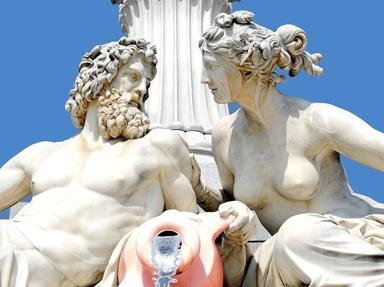Quiz Answer Key and Fun Facts
1. Japan's epic hero and historical figure uniquely wrote his own epic! The Imperial Navy named a giant battleship after him in World War II. Can you identify this samurai poet, musician, philosopher and warrior?
2. Spain's epic hero was a historical person. Rodrigo Diaz de Bivar was born a member of the minor nobility, but became Prince of Valencia by his own hand. He is known by the title his Moorish subjects gave him in Valencia. Charlton Heston portrayed the hero in the 1961 movie that shares the title. Name Spain's epic hero.
3. England's great epic hero never saw the island of Britain! The epic unfolds in 3182 lines of Old English as the hero aids King Hrothgar by killing the monster making his great Hall Heorot unlivable. Who is the hero of England's national epic?
4. "The Song of Roland" (1115 CE) is the national epic of France. It's a romanticized tale of an historical man. Roland is known by another name as well, based on the Italian adaptation of the myth. That name was taken for what is now the metropolis hosting Disney World. What is Roland's Italian name?
5. Great Britain's vast literary tradition has left the island nearly awash with epic heroes. Almost every English speaker knows at least the outline of the story of the Cornishman from Tintagel who had a wizard for a tutor and an impressive "circle" of warrior friends. What is the full name of Britain's royal hero?
6. Ireland's Ulaid (Ulster) Cycle of legend tells of a beardless lad named Setanta who became known as Cullen's Hound for killing and then serving in place of neighbor Culhain's fierce dog. Beardless still, he became Ulster's greatest hero, once standing off an entire army for five days aided only by his charioteer. What is the Old Irish name by which he is known?
7. Switzerland's hero archer was well known in continental Europe even before Gioachino Rossini's 1829 opera spread his fame even further. What apple shooting, tyrant killing crossbowman is Switzerland's great hero?
8. Several towns in Maine, Minnesota and Wisconsin in the United States claim to be the "birthplace" of the mythical giant lumberjack of the Great North Woods. Nobody is claiming the massive blue ox. Among his many feats, it's claimed the Grand Canyon exists because he dragged his axe there. Who was the giant who hung out with Babe?
9. An 1876 opera by Richard Wagner assured the modern survival of a mythical Teutonic hero. Less than invulnerable German defensive lines were named for him in each of the World Wars. Who was this Teutonic hero?
10. This son of Zeus was named Alcides at birth, but his name was changed in a vain attempt to propitiate the goddess who kept trying to destroy him. He is renowned for twelve great labors, and got the better of gods and titans repeatedly. The Romans stole him entire for their mythology, changing his name slightly. Who is the best known hero of the ancient Mediterranean world?
Source: Author
Jdeanflpa
This quiz was reviewed by FunTrivia editor
ponycargirl before going online.
Any errors found in FunTrivia content are routinely corrected through our feedback system.
